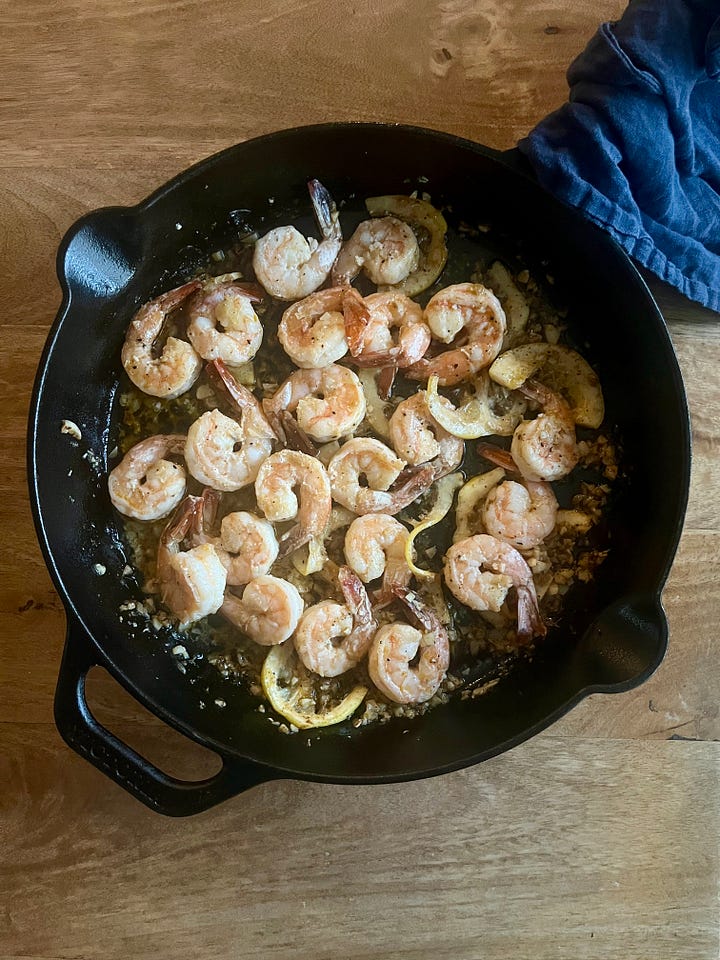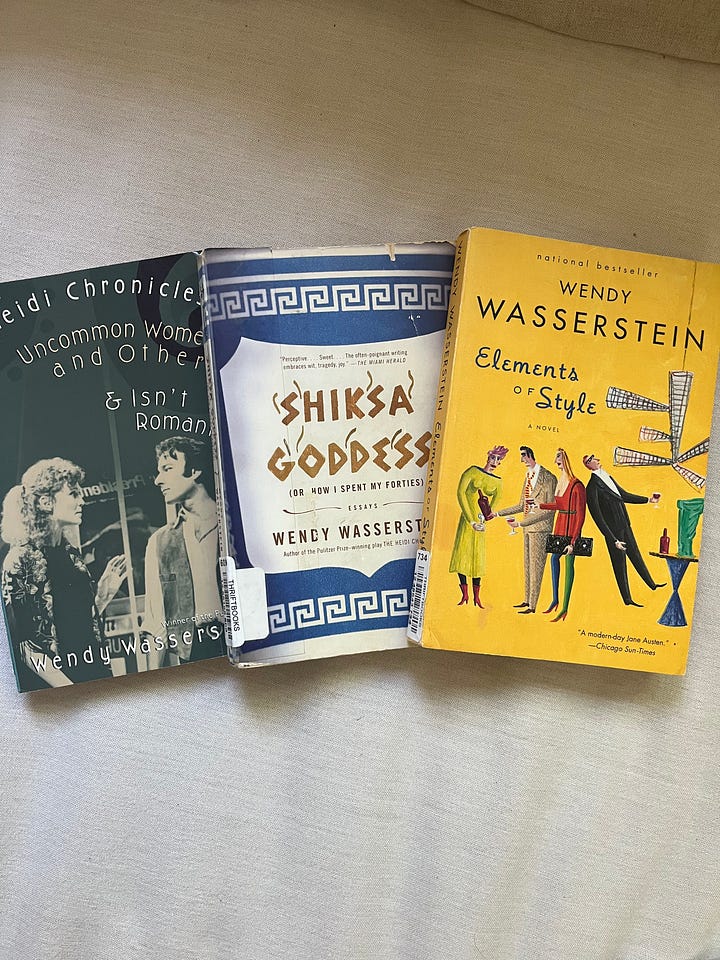

Hi! I’ll be taking the next installment off because I’m embarking on a trip! (London and Greece, if you must know. Yes, I have a crazy list and yes, I’ve been counting down for literal weeks.) I’m hoping to return with many book thoughts and heaps of honey/dairy/olive oil intel for you all. Before I go: An author I recently discovered thanks to my mom; and a shrimp recipe I cannot stop making that comes together in 10 minutes.
Read
Anything/everything by Wendy Wasserstein (i.e. The Heidi Chronicles & Other Plays, pub. 1991, Shiksa Goddess, pub. 2001, Elements of Style, pub. 2006)
Buy: Secondhand online (Thriftbooks is always a good resource) or your local used bookstore
I’m embarrassed to say that I hadn’t heard of Wendy Wasserstein until a few months back when my mom sent me this New Yorker piece from 2000. I read it in a fever. Who was this woman? So charismatic! So charming! So funny! So deep! I immediately swept up and through her oeuvre: plays, essays and a sole novel, published posthumously in 2006 – Wasserstein died tragically at the age of 55, leaving behind a trail of fantastic work and a bevy of fans / mourners in her wake.
Wendy Wasserstein was many things, but at her heart she was a playwright. To be honest, I find reading plays somewhat impenetrable, so I mostly avoid them. But Wendy’s plays are different. She’s like Nora Ephron, Laurie Colwin and Mel Brooks rolled into a single vivacious human; she writes about life and women, societal and parental expectations, choosing the road less traveled. Take The Heidi Chronicles, written in 1988, which earned her a Pulitzer and the first-ever Tony awarded to a play written solely by a woman. It tracks the lives of Heidi Holland and her friends, starting in high school in the 1960s, through their 20s and 30s. Heidi (intelligent, wry and watchful) and her friends connect with the idea of what feminism espouses – a shared perspective, a collective of women going against the grain – yet she watches as, one by one, they slowly pair off, choosing social safety over a concept of the future that might not involve love and marriage. Heidi finds no sense of security in the herd mentality, nor in shacking up with men whose egos outweigh their promises. She outwardly grapples with her choices (it’s not easy to be the one left standing, fighting for a cause you thought your peers believed in), but sticks to them nonetheless.
Janie Blumberg is the rueful heroine of Isn’t It Romantic (1984), a deeply comedic and heartfelt romp through New York City in the 80s. I think I might’ve liked this play even more than Heidi, mostly because Janie is so incredibly likable and sweetly rendered. Wendy writes Jews with a fluidity only accessible to someone who grew up amid the chaos and neuroses of an overbearing Jewish mother. Janie’s parents heave equal parts adoration and expectation upon her. She finds love in the form of a man her parents find acceptable, fooling herself until she can’t anymore. Like Heidi, she has career goals she doesn’t want to sacrifice, and refuses to settle for a cookie cutter partner. She, too, has a best friend who parrots an unconventional lifestyle yet inevitably chooses the opposite out of fear.
Shiksa Goddess is an essay collection I really enjoyed. It’s a cozy read about life as a 40-something woman living in Manhattan in the 90s. In my experience, pre-tech-boom books have such a different tone about them. There’s a sense of groundedness, as if the characters aren’t distracted because the authors themselves aren’t. I find it extremely centering to read books (and watch movies) where zero iPhones are present. Does anyone else have this experience?!
Real quick: Elements of Style, Wasserstein’s sole novel, is a social satire about New York elites that’s equal parts dark, funny and fully politically incorrect. I wouldn’t necessarily recommend it if you’re looking for a meaningful read, and it’s quite difficult to swallow casual racism from 20+ years ago. But it’s part of her body of work and it gives a fuller picture of what her future might’ve looked like had she lived longer. [I don’t mean to be flippant about racism in any way, and Wendy was heavily involved in much social reform; it’s an indication of the time that both things could be true simultaneously.]
Eat
I’ve made this twice in the last two weeks because it is SO moreish and easy to throw together. It was inspired by Alison Roman’s shrimp skillet, but I took it in a less spicy direction (I’m a wimp with spice). The spiced oil is excellent drizzled over roasted maitake mushrooms, too (and even better when said mushrooms are then stuffed into tacos). Specific but true!
Spiced Shrimp Skillet
Serves 2-4
1 pound shell-on shrimp (you can buy frozen or fresh; head-on are great, too, if brain-sucking is your kink)
½ head garlic, cloves minced (yes, this is a LOT of garlic; cut down if you aren’t into it)
1 lemon, ½ sliced into super-thin rounds, the other half reserved
Good butter
Spiced oil (recipe below)
Maldon
Spiced Oil
Makes ½ cup
½ cup evoo
½ teaspoon sweet smoked paprika, aka pimentón dulce
½ teaspoon sumac
½ teaspoon urfa biber (a dried Turkish chili that is a must-have for your pantry!)
Kosher salt
To make the oil: In a small saucepan over medium heat, heat the oil until it gently shimmers. Add the spices and sizzle for 30 seconds. Remove from heat and add a pinch of salt. Set aside.
To make the shrimp: In a large cast iron skillet set to low heat, spoon about ¼ cup of the spiced oil. Add the garlic and lemon slices and sauté, stirring frequently, until lightly caramelized but not browned. Increase the heat to medium, add the shrimp, a knob of butter and another couple spoonfuls of the oil and mix well. Sauté until pink, about 3 minutes per side. Add another spoonful or two of the spiced oil, another knob of butter and squeeze the reserved lemon half over the top. Give it a good stir and season with Maldon before serving (ideally with crusty bread for mopping up the delicious pan juices).




This was such an insightful description of a writing style I wish we felt more often:
It’s a cozy read about life as a 40-something woman living in Manhattan in the 90s. In my experience, pre-tech-boom books have such a different tone about them. There’s a sense of groundedness, as if the characters aren’t distracted because the authors themselves aren’t. I find it extremely centering to read books (and watch movies) where zero iPhones are present. Does anyone else have this experience?!
Yes I so totally agree about books and movies without iPhones. I yearn for that!